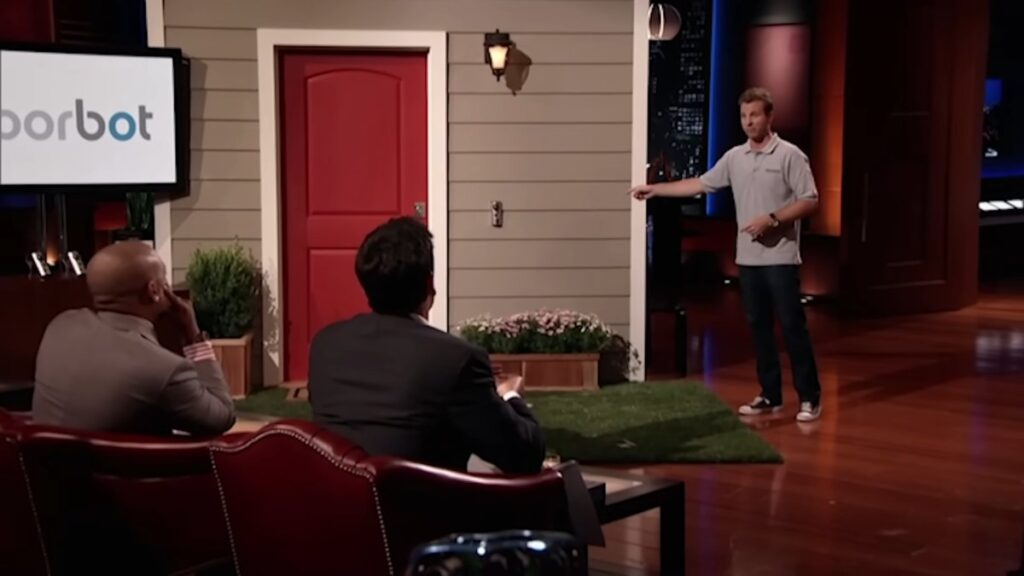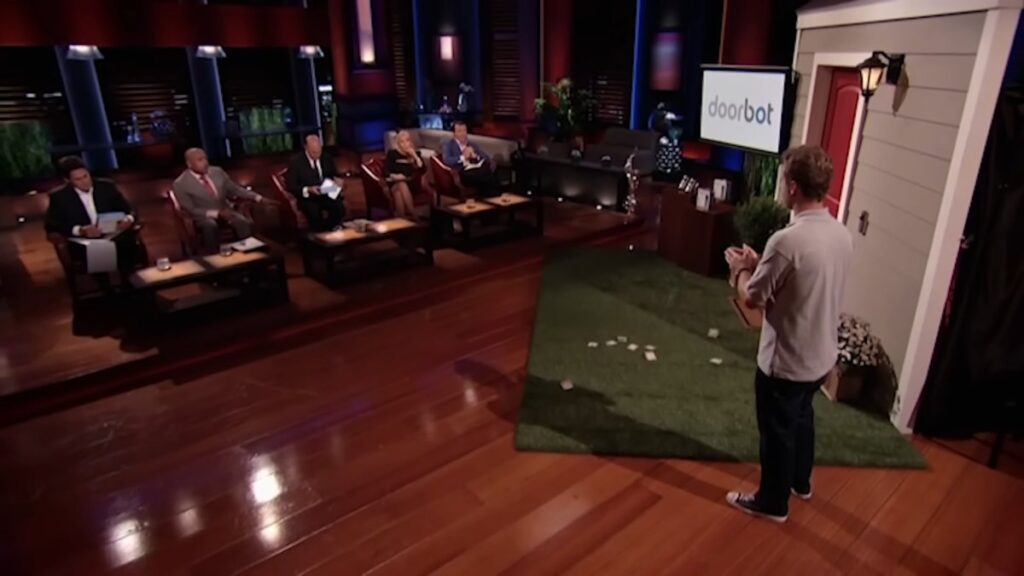Key Highlights
- Jamie Siminoff pitched his smart doorbell, DoorBot, on Shark Tank, seeking $700,000 for 10% equity.
- Despite a promising pitch, DoorBot (now rebranded to Ring) did not receive a deal on Shark Tank.
- The company was acquired by Amazon in 2018 for around $1 billion.
Imagine pitching your startup idea on Shark Tank, walking away with no deal, and then becoming part of a billion-dollar acquisition.
That’s exactly what happened with DoorBot (now called Ring). Founder Jamie Siminoff appeared on Season 5 of Shark Tank in 2013, seeking investment for his Wi-Fi doorbell camera device.
Siminoff conceived the product when he realised one day he couldn’t hear his front doorbell ring—so he built a Wi-Fi video doorbell so he could answer from his smartphone.
Years later, Ring was acquired by Amazon and has grown into a major home-security brand.
We’ll dig into what’s happened since the Shark Tank pitch, its net-worth today, and what entrepreneurial lessons can be drawn from Jamie Siminoff’s journey.
Doorbot/Ring Overview
| Field | Info |
| Company name | Ring (formerly DoorBot) |
| Founder(s) | Jamie Siminoff |
| Industry | Smart home security / home-automation |
| Product name | Ring Video Doorbell (and associated cameras/sensors) |
| Episode aired | November 15, 2013 (Season 5) |
| Asking | US $700,000 for 10% equity |
| Valuation | Estimated $7 million pre-Shark Tank pitch |
| Result | No deal accepted |
| Shark with deal | — (no investment made) |
Net Worth: How Much Is Doorbot/Ring Worth Today?
When Ring was acquired by Amazon in 2018, industry estimates placed the value at about $1 billion. Since then, as part of Amazon’s devices & services ecosystem, Ring’s individual valuation is not publicly separated.
But we can infer that its integration into Amazon’s smart-home portfolio has given it substantial scale and revenue. For example, some sources note early revenue of “$274 million a year” for Ring around 2022.
At its Shark Tank valuation (~$7 million) and acquisition (~$1 billion), that represents over 140× growth in value. The dramatic jump reflects market demand for smart-home security, Amazon’s distribution power, and Ring’s expansion of product lines (doorbells, cameras, alarms).
The company faces various challenges around privacy and regulatory issues.
Jamie Siminoff Net Worth
Jamie Siminoff, the founder of Ring, is estimated to have a net worth of about $300 million as of 2025.
His wealth primarily stems from Amazon’s $1 billion acquisition of Ring in 2018, after he famously pitched the idea on Shark Tank in 2013 and was rejected.

At the time of the sale, Siminoff reportedly owned about 10–15% of the company, earning him an estimated $110–150 million payout before taxes. He also received a portion of the payment in Amazon stock, which has appreciated significantly over the years, further increasing his net worth.
Beyond Ring, Siminoff continues to invest in and advise startups within the tech and smart-home sectors.
After serving as Ring’s CEO for several years post-acquisition, he later became Chief Inventor at Amazon’s subsidiary and has since launched new ventures like Haven, a privacy-focused home security company.
DoorBot Shark Tank Pitch
Siminoff pitched DoorBot (now Ring) as a solution for homeowners who miss visitors or deliveries when they’re not at home. The device allowed smartphone-connected video doorbell interaction—see who’s at your door and speak to them remotely.
Siminoff asked for $700,000 in exchange for 10% equity. The Sharks liked the technology but had reservations.
Lori Greiner questioned uniqueness, Mark Cuban doubted the growth trajectory, Robert Herjavec worried about hacking risk.
Kevin O’Leary made an offer: $700,000 with a 10% royalty (dropping to 7% after repayment) + 5% equity. Siminoff countered but then declined, walking away without a deal.
DoorBot Product Price on the Show
At the time of the pitch, Siminoff mentioned about $1 million in sales within nine months. The retail price then was around $199; cost of goods about $81.
Did Ring Get a Deal on Shark Tank?
No — the founder did not accept any deal from the Sharks. The only offer was from Kevin O’Leary, which was rejected, and thus the company left without Shark funding.
What Happened to DoorBot After Shark Tank
Although no deal was made, the Shark Tank appearance drove exposure and new sales. The company quickly expanded its product line, rebranded to Ring in 2014, and brought on investors like Richard Branson.
Before the Amazon acquisition, Ring raised over $200 million in funding. In 2018, Amazon acquired Ring for around $1 billion. On the flip side, Ring has faced controversies: privacy issues, partnership with law enforcement, data-sharing concerns.

Privacy critiques have grown. The company has acknowledged providing user footage without consent in some cases. With its expanded scale under Amazon, balancing growth with regulatory scrutiny is a key challenge.
How Is DoorBot Doing Today?
Ring remains active — still selling its video doorbells, cameras and ecosystem accessories. In April 2025, founder Jamie Siminoff returned to Amazon in a leadership role for Ring/Blink in an executive role as Vice President.
While Amazon does not break out Ring-specific revenue publicly, the range of product offerings and scale suggest solid performance. Grips Intelligence estimated Ring’s annual revenue for 2024 reached $420.9m.
Where to Buy Ring Video Doorbell
- Official website: ring.com
- Amazon: Ring Video Doorbell
- Retailers: Best Buy, Home Depot, etc.
Ring’s Social Media & Online Presence
- Instagram: @ring
- X/Twitter: @ring
- Facebook: Ring
- YouTube: Ring channel
Competitors and Market Comparison
Compared to other smart-home brands:
- Google Nest Video Doorbell: premium pricing, strong ecosystem in Google universe.
- Eufy Security: value-oriented, fewer integrations with big platform.
What sets Ring apart: early mover in WiFi doorbell cameras, wide retail distribution, deep integration with Amazon’s ecosystem, and large user base (including Neighbors app network).
Lessons from Ring’s Shark Tank Journey
- A “no deal” on a popular show doesn’t mean failure — Ring persevered and scaled.
- Exposure counts: the Shark Tank appearance boosted awareness even without investment.
- Strategic acquisition can validate a product — aligning with a major platform (Amazon) gave Ring reach and resources.
- Business success also brings new responsibilities — privacy, data, and regulatory issues become bigger as scale grows.
Was Ring Acquired or Rebranded?
Yes — DoorBot was rebranded as Ring in 2014. In 2018 Amazon acquired Ring; founder Siminoff later left and then came back in 2025.
Ring Timeline Recap
- 2013: Appeared on Shark Tank, no deal.
- 2014: Rebranded from DoorBot → Ring.
- 2018: Acquired by Amazon for around $1 billion.
- 2024: Settlement with U.S. FTC for $5.6 m over privacy issues.
- 2025: Jamie Siminoff returns to lead Ring division at Amazon, signals product/AI pivot.
Behind the Scenes: The Founder’s Journey Post-Tank
After Shark Tank, Siminoff built Ring without Shark funding, then led its growth through acquisition.
He later left Ring in 2023 to lead another smart-home venture, then returned in 2025 to Amazon. His journey shows persistence, pivoting, and leveraging both hardware and platform play.
FAQs About Ring
- Is Ring still in business? Yes — as part of Amazon’s device portfolio, Ring remains active.
- Who owns Ring now? Amazon owns Ring.
- How much revenue does Ring make? Specific current revenue isn’t broken out publicly; earlier estimates were about $420.9 million/year in 2024.
Conclusion
From a garage-based idea to a billion-dollar acquisition, Ring’s journey is a textbook startup turnaround.
The Shark Tank appearance may have ended without a deal, but it provided exposure that helped fuel subsequent growth. The Amazon acquisition marked a major milestone—but the story doesn’t end there.
With founder Jamie Siminoff back at the helm in 2025, Ring is once again pushing toward innovation in smart-home security, even as it navigates big questions around user privacy and data.
For entrepreneurs, Ring’s trajectory highlights that initial rejection isn’t fatal—and that aligning with the right platform and scale can change everything.
Sources
- Forbes: “The Exclusive Inside Story Of Ring: From ‘Shark Tank’ Reject To Amazon’s Latest Acquisition” — Forbes
- LA Times: “With sale to Amazon, doorbell start-up Ring goes from ‘Shark Tank’ reject to L.A. tech scene’s latest success”: Los Angeles Times
- Wikipedia: “Ring (company)” overview: Wikipedia
- Business Insider: “Amazon’s Ring goes full founder mode, taking the company back to its crime-fighting roots”: Business Insider
Related Posts:
